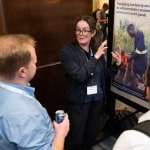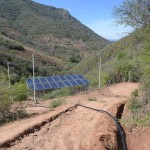The latest on our work and those supporting it
Human Rights Day Through the Lens of Water Access
Human Rights Day, celebrated on December 10, honors the adoption of the Universal Declaration of Human Rights. What role does water play in human rights?
Thankful for Water: Voices from Sub-Saharan Africa
This Thanksgiving, as we gather with family and friends, let’s take a moment to appreciate something simple yet essential: clean water. For many, turning on the tap is an afterthought. But in communities served by The Water Project, access to clean, safe water is a transformative gift — one that inspires deep gratitude. Here are […]
From Taboo to Action: Addressing the Global Sanitation Crisis
November 19th was World Toilet Day, inaugurated to address the world’s ongoing sanitation crisis.
Reflections on the UNC Conference: Collaboration and Insights for a Water-Secure Future
Back in October, four members of The Water Project’s (TWP) staff attended the internationally recognized University of North Carolina (UNC) Water and Health Conference in Chapel Hill, North Carolina. As a Water, Sanitation, and Hygiene (WASH) non-profit, The Water Project always gains significant knowledge from this conference, and this year was no different. Below are […]
Global Handwashing Day 2024
In honor of yesterday’s Global Handwashing Day, we’re highlighting how we train community members to wash their hands in Western Kenya — and why handwashing is so important. Often, when we first enter a community, we’ll find that the community hasn’t been washing their hands effectively, as is the case in the video below. In […]
What is a scoop hole?
Scoop holes are common where The Water Project works in sub-Saharan Africa, but other parts of the world will likely never have heard of one. Although you can infer a lot from the name itself, it doesn’t tell the whole story. A scoop hole is a shallow hole dug down into the ground to access […]
Zero Emissions Day: How Solar Technology Can Effectively Replace Diesel Pumps for Water Distribution
Today is Zero Emissions Day, an occasion to remind us all of the harmful effects of carbon emissions on our Earth. To celebrate, we thought we’d highlight our increasing work on solar-pumped water projects. In 2025, we’re planning two solar projects, both at healthcare facilities: one in Sierra Leone, and the other in Western Kenya. […]
Takeaways from World Water Week
Program Director Spencer Bogle represented The Water Project at World Water Week in Stockholm, Sweden. Here are a few of his experiences and takeaways.
What We Train Community Members About in Each of Our Service Areas
Providing clean water is only part of what we do at The Water Project. The other part is spreading knowledge about proper hygiene and sanitation methods to reduce disease. Most of what we do to maintain a clean and safe environment requires water: handwashing, washing dishes, personal hygiene, etc. When water is scarce or people […]
How to Find the Best Water Charities
Introduction When you donate to a clean water charity, you want to make sure your money makes a real impact. With many top-rated water charities asking for donations, it’s hard to know which ones are best. This blog post will help you find the best water charities by examining three important values: reliability, relationship, and […]










